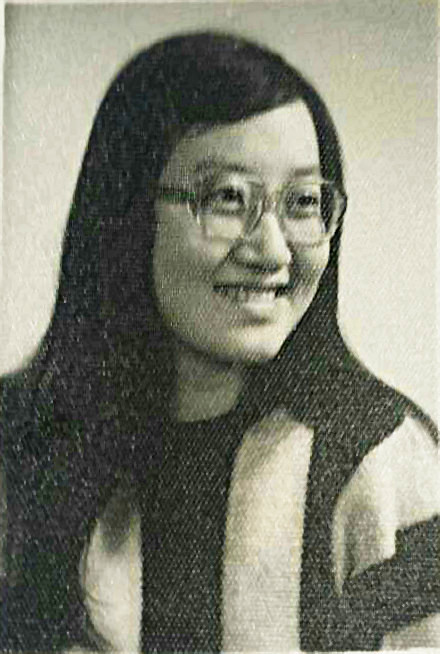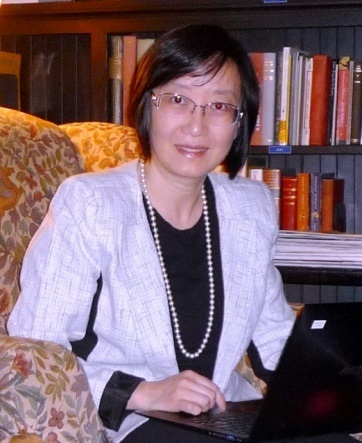

(何)杨纬芸 [Agnes He]
2015年1月4日
一转眼竟然已经是三十年, 岁月纷呈。 三十年前的北外,像是很久以前到过的一个地方,当时不觉得奇特 ,现在回过头看,今天所有到达的地方都是以那里作为起点。
记得刚入校一年级时的沈树红老师, 好像刚刚从夏威夷大学进修回来,试图用新的以学生为中心以交流为主旨的方式来教授我们的五班, 当时上课的时候老师和同学围坐成一圈,以研讨的方式教和学,还是很新鲜的事情 。 记得杜学增老师,他后来当过我的班主任,有一次我在苏州街的一个小卖部买蜜耳朵吃, 刚刚贪婪地咬下一大口,一转头看到杜老师,又窘又急,竟满嘴含着蜜耳朵,喊了一声“增老师!” 记得朱鑫茂老师,自学英语的楷模,他的英语语音天才般的纯正。 记得邓炎昌老师, 在没有网络, 第一手资料匮乏的条件下,滔滔不绝的给同学们讲解美国社会与文化,还在堂上让学生传阅一份早已过期的 US News and World Report 。袁鹤年老师请来了聂华苓做讲座, 那是我第一次听说The Iowa Writers’ Workshop。 跟David Crook 上世界历史课,还记得他使用的大概是英美国家的中学历史课本。吴祯福老师教口语,她巧妙地教给我们如何把一件事情用英语多遍叙述,甚至可以借用他人的描述方式,直到融会贯通,出口成章。 还有那位迷人的年轻法语二外老师, 他教的法文我已经忘得惭愧, 历历在目的是他朗读法文时浓重的鼻腔元音和他那分不清到底是明朗还是忧郁的眼神。 杨立民老师诙谐幽默,思维敏捷, 他从美国当 Fulbright scholar 回来, 给我们谈他的见闻, 开场便说, “America is a big country but it can also be very small. It all depends on how much you travel when you are there.” 朴实无华的简单几句,把世界的真理说得犀利透彻 。更有许国璋教授,谆谆教诲81级新生,不能只学英语而不学文化知识, 否则只能变成“会说英语的文盲”---- 这句话让我受益终生。胡文仲老师探索跨文化跨语言交流的研究和教学,大概十年前我们在世界应用语言学年会上邂逅,他依然儒雅睿智,是我永远的老师。吴一安老师对指示代词和认知空间的见解以及她的敬业态度都让我钦佩,能够在和她邻近的领域做事是我的荣幸 。
记得每天抱着一部厚厚的双解词典, 精读再精读。 记得糊里糊涂地看 The Great Gatsby, The Catcher in the Rye, To the Lighthouse, 对其中的背景,手法和含义一知半解。比较能够理解比较能够欣赏的是Jane Austen, the Brontë Sisters, 和 Charles Dickens。 等到能够读略带哲理的 Bertrand Russell, 就开始自鸣得意了。英美诗歌完全没有学入门,只是浮皮潦草对Shelley, Byron, Wordsworth, Whitman的名字略有印象。 记得在英语系图书馆前面排队,等它开门,为的是第一个抢读本周的 Times, Newsweek 杂志。 听力的飞跃不清楚具体在哪一年发生的, 只记得头一两年每周三晚上的英文电影录像看得混混沌沌, 一头雾水, Ben Hur, Kramer vs Kramer, The French Lieutenant's Woman, Apocalypse Now, 等等等等,都是多年以后重新看一遍,才搞明白它们的内容,才能领会其中语言和文化的细腻。那时在课堂上不敢发言,很怕出错,现在想想错过了很多学习语言,训练思维,完善品格的机会。毕业论文写的大致是美国的总统选举,现在再读那篇文字会羞愧得无地自容, 但那也算是初生牛犊吧。
除了给了我另外一种探求世界表达自己的语言之外,北外给我的最大的财富是我的同学。 刚刚入学的时候16岁, 在北外的四年使我在各种意义上成人。 几位当时一起上课吃饭打水洗澡打球跑步在大教室和图书馆帮忙占座位的同学成为我终生的朋友, 在人生的各个阶段分享快乐分担忧愁, 并在我后来生活中最困难的时候给我坚定无私的帮助。她/他们不看我的地位和处境,给了我最纯洁的友谊。另外一些原来不太熟悉的同学,因为各种偶然,我们的生活轨迹又相交,让我又有了新的机遇和收获。
最后要讲讲亦师亦友的辅导员高连友老师。在北外时我对他是敬而远之。毕业以后,才慢慢了解到他的善良曲折丰富。两年前他写给我的一封电子信件,如此善解人意,感动得我眼泪夺眶而出。高老师让我又一次见证了人是不断变化的,人的最高智慧来自一颗善良光明的心。
常有人问我最初从哪里来,在哪里学的英语。常有人不相信我的答案。我会尽量平和耐心地解释,那是中国最好的外语学院,我在那里不过是个循规蹈矩的学生,勇于创新敢于担当对于我是后来的事情。比我更有想象力和创造力的的北外毕业生有的是。


(何)杨纬芸 [Agnes He]
May 3, 2015
Recent posts on Beiwai-81 WeChat and conversations at the mini-reunion in New York City yesterday prompted me to dig deeper into the reasons why I am or should be grateful for my college education at Beiwai. Undoubtedly an undergraduate degree in English (the language that for the moment holds the greatest symbolic capital) has afforded me language skills that have led to a competitive edge. Surely it has helped me expand my personal horizons and become a more responsible and engaged citizen. And indeed Beiwai has blessed me with some exemplary teachers and lifelong friends.
But these are not all the reasons, perhaps not even the most important reasons, why I should be grateful for Beiwai.
The real magic of the Beiwai education lies in the transformative power of learning another language. It is not the English syllables and syntax that made much difference. It is instead the assimilation of new sense and sensibility and new ideas and ideals through English that has set me on my life’s trajectory today.
I readily admit that, as a college student in the 1980s in China, I probably witnessed more conformity than creativity, more imitation than innovation, and more regurgitation than reflection. Whatever language skills I was able to master upon graduation appeared woefully inadequate in the first year of graduate school in the U.S., when I could barely handle reading hundreds of pages of textbooks at short notice, when I had no clue how to write a research paper, when I had not an iota of idea about giving an oral presentation, when I was invariably tongue-tied every time someone asked for my opinion. But, owing to the English communicative ability (albeit limited) I acquired at Beiwai, I was able to learn at great speed, from mentors, friends, classmates, students, neighbors and strangers alike. I was able to soak up like a sponge new norms and values that are embodied in the new nouns and verbs. I was able to eventually free myself from the shackles of the monolingual world and to imagine new ways of being. And THAT is the real reason why I shall remain forever indebted to Beiwai.
So today if I have, by any luck of the draw, become wise, loving and distinguished, I should be grateful to Beiwai. If I have turned out mediocre or miserable, then that is my lot. I have no right to fault Beiwai for my own disappointment. For as the Chinese adage goes, 师傅领进门,修行在个人.